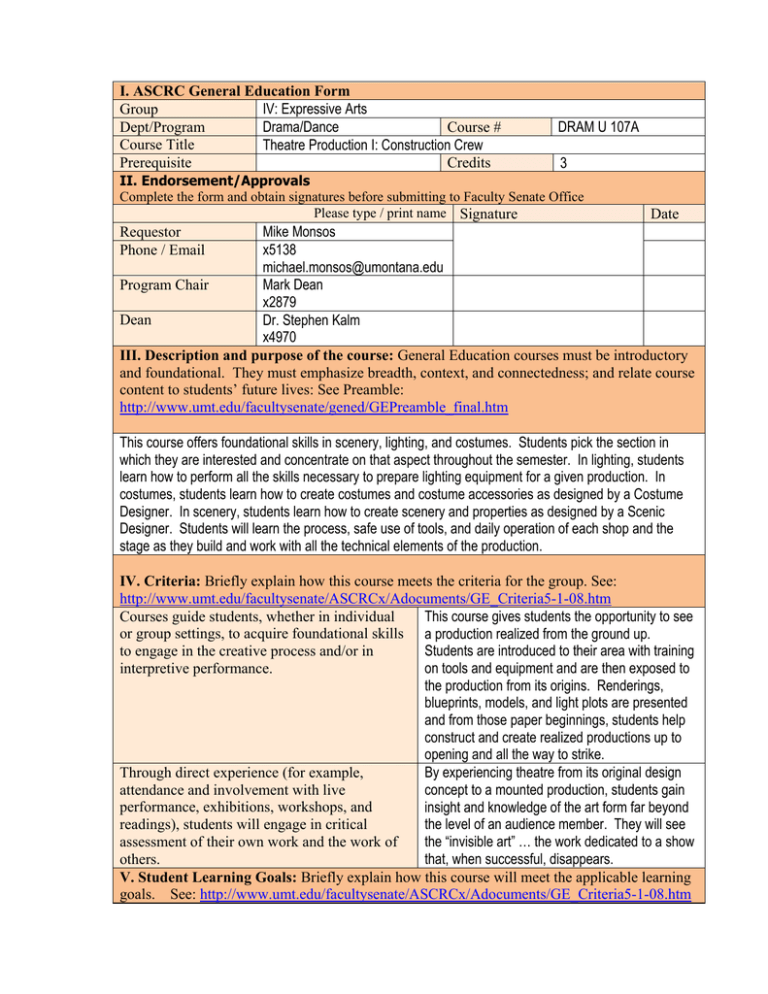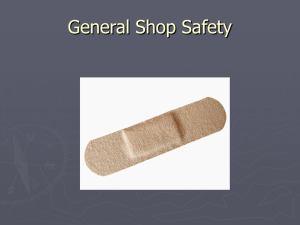I. ASCRC General Education Form IV: Expressive Arts Group Drama/Dance
advertisement

I. ASCRC General Education Form Group IV: Expressive Arts Dept/Program Course # Drama/Dance Course Title Theatre Production I: Construction Crew Prerequisite Credits DRAM U 107A 3 II. Endorsement/Approvals Complete the form and obtain signatures before submitting to Faculty Senate Office Please type / print name Signature Date Mike Monsos x5138 michael.monsos@umontana.edu Program Chair Mark Dean x2879 Dean Dr. Stephen Kalm x4970 III. Description and purpose of the course: General Education courses must be introductory and foundational. They must emphasize breadth, context, and connectedness; and relate course content to students’ future lives: See Preamble: http://www.umt.edu/facultysenate/gened/GEPreamble_final.htm Requestor Phone / Email This course offers foundational skills in scenery, lighting, and costumes. Students pick the section in which they are interested and concentrate on that aspect throughout the semester. In lighting, students learn how to perform all the skills necessary to prepare lighting equipment for a given production. In costumes, students learn how to create costumes and costume accessories as designed by a Costume Designer. In scenery, students learn how to create scenery and properties as designed by a Scenic Designer. Students will learn the process, safe use of tools, and daily operation of each shop and the stage as they build and work with all the technical elements of the production. IV. Criteria: Briefly explain how this course meets the criteria for the group. See: http://www.umt.edu/facultysenate/ASCRCx/Adocuments/GE_Criteria5-1-08.htm Courses guide students, whether in individual This course gives students the opportunity to see or group settings, to acquire foundational skills a production realized from the ground up. to engage in the creative process and/or in Students are introduced to their area with training interpretive performance. on tools and equipment and are then exposed to the production from its origins. Renderings, blueprints, models, and light plots are presented and from those paper beginnings, students help construct and create realized productions up to opening and all the way to strike. Through direct experience (for example, By experiencing theatre from its original design attendance and involvement with live concept to a mounted production, students gain performance, exhibitions, workshops, and insight and knowledge of the art form far beyond readings), students will engage in critical the level of an audience member. They will see assessment of their own work and the work of the “invisible art” … the work dedicated to a show others. that, when successful, disappears. V. Student Learning Goals: Briefly explain how this course will meet the applicable learning goals. See: http://www.umt.edu/facultysenate/ASCRCx/Adocuments/GE_Criteria5-1-08.htm The skills learned in the shops enable students to express themselves more completely and more visually, in a manner that extends beyond the text and the performance. Students will learn how the designed elements are part of the creative product and how they can strengthen the production, which will in turn help students create a more complex performance as they develop their own original work. Upon completion of this perspective, students Although theatre is possible without scenery, will be able to understand the genres and/or lights, and costumes, it can be greatly enhanced forms that have shaped the medium. by their correct use. Students will discover how the medium of designed elements of a production have a great opportunity for expressions of concept and how their use can positively affect a production. Upon completion of this perspective, students Students will be able to appreciate, understand, will be able to critique the quality of their own and question the technical elements of any work and that of others. production to a more informed and intelligent degree through the experience of creating those same elements. Learning how to build all the elements of the theatrical environment brings a respect for well executed scenery, lights, or costumes along with the ability to properly critique those same components. VII. Syllabus: Paste syllabus below or attach and send digital copy with form. ⇓ The syllabus should clearly describe how the above criteria are satisfied. For assistance on syllabus preparation see: http://teaching.berkeley.edu/bgd/syllabus.html Upon completion of this perspective, students will be able to express themselves in the making of an original work or creative performance. Production Construction I/II: Scenery Drama 107A/207 Sections 01 & 04: 3 CREDITS PARTV 140: Scene Shop Fall 2008 MW 1:10-5P/TR 2:10-6P Instructor: Jason McDaniel Office Phone: 243-4511 jason.mcdaniel@umontana.edu Objective: The objective of this course is to obtain a basic understanding of scenery construction and the tools required for it, while creating realized projects to be used in Drama/Dance productions. It is the scene shop’s responsibility to build and paint scenery as designed by a show’s scenic designer. The designer gives drawings, renderings, paint elevations, and/or models to the technical director, who then creates working drawings for the shop. During this course, you will learn to read and understand these documents. Text & Materials: No books are required for this course. Instead, each student is responsible for obtaining and bringing to each crew period: • SAFETY GLASSES THAT MEET ANSI STANDARD Z87.1-1989 (No tinted lenses) • HARDHAT THAT MEETS ANSI STANDARD Z89.1-1987 • 25-FT. TAPE MEASURE THAT MEASURES TO THE 1/16” • LEAD PENCILS I do not require them, but I do recommend you also bring: • Leather gloves • Leather boots or shoes (steel-toed are always a plus) Class Meeting Times: This is a two-day-per-week course, either M/W 1:10-5 p.m. or T/TH 2:10-6 p.m. You are expected to work a total of 100 hours and attend at least two strikes in order to pass this course. Strike schedules will be posted on the scene shop’s notice board the week of the strike. You will be responsible for signing up for the strike you plan to attend. This needs to be done no later than 4 p.m. on the Friday before said strike. Any strikes that are required for Run Crew or are part of being in a production’s cast will not count towards your two strikes. Course Requirements: To pass this course you must complete the following things: • At least100 productive hours • 2 scheduled strikes • Complete and maintain a minimum of the first 15 tools training You letter grade will be based on the completion of all of the previous items and the score of your Performance Evaluation (see attached). Theatre is a collaborative art, so everyone involved plays a part in each performance. Through your enrollment in this course, you are automatically a vital part of the scenery’s being ready when the curtain goes up. Therefore, simply being present for 100 hours and two strikes do not constitute an “A.” The Performance Evaluation Score is a standardized assessment of your willingness to work, preparedness for each class, retention of training, readiness to help classmates, attention to safety, respect for equipment, and progress in basic scenic construction skills. Policies: Please be prepared for every class. My definition of being prepared is as follows: • Dress in a manner appropriate for work in a shop. You will get dirty! Shoes cannot be slip-ons or open-toed. Clothes cannot be extremely baggy or formal (jeans and a t-shirt make a common uniform). Long hair must be tied back and contained so it does not fall forward; jewelry that may dangle into the moving parts of a tool is prohibited. • Be ready to receive instruction at the top of the scheduled hour. Our time in the shop is limited and it wastes that time if you don’t arrive until 1:10 p.m. (or 2:10 p.m.) but still need five minutes to get ready. • Have the required items with you (tape measure, pencil, and safety glasses) and ready to use at the top of the scheduled hour. If you are not fully prepared for class, I reserve the right to release you from any duties for the day, which will prevent you from getting hours for the day. A shop runs most effectively when it is clean and organized. At the end of each day, we will stop working no later than 15 minutes prior to the end of class so everyone can help clean the entire shop. The shop must be cleaned to my or another scene shop staff member’s satisfaction, with the use of the shut-down checklist, before students are excused. You will be required to be signed in at the start of each work period. At the end of class everyone will be signed out and excused at the same time. You may not leave the shop until I or another staff member signs you out. Without both sets of initials (sign-in and –out), your hours for that day will not count. Your attendance is essential to the completion of each show and also to obtaining the 100 hours necessary to pass the course. If you know you must be late or absent, please call my office (243-4511) to let me know as soon as possible. Unexcused missed hours cannot be made up. If you are late or leave early four times it will count as one unexcused day. The working of additional hours is acceptable and will be reflected in your final grade. Academic Misconduct and the Student Conduct Code: All students must practice academic honesty. Academic misconduct is subject to an academic penalty by the course instructor and/or a disciplinary sanction by the University. All students need to be familiar with the Student Conduct Code. The Code is available for review online at http://www.umt.edu/SA/VPSA/Index.cfm/page/1321. Drama/Dance Majors: All Drama/Dance students must have an in-depth knowledge of the practices and procedures outlined in the Department of Drama/Dance Handbook. The Handbook is available online at http://www.sfa.umt.edu/drama/index.html. Production Construction I/II: Costume Drama 107A/207 Sections 01 & 04: 3 CREDITS PARTV 040: Costume Shop Fall 2008 MW 1:10-5P/TR 2:10-6P Instructor: Lisa Marie Hyslop Office Phone: 243-5721 lisa1.hyslop@umontana.edu Objective: The objective of this course is to obtain a basic understanding of costume construction techniques while creating realized projects to be used in Drama/Dance productions. It is the costume shop’s responsibility to build and/or produce costume, crafts, hair, and make-up as designed by a show’s costume designer. The designer gives renderings to the costume shop; it is the job of the costume shop crew (particularly the cutter/drapers) to interpret to create the actualized creations. During this course, you will observe and participate in this realization process. This course is specifically designed to teach construction techniques as dictated by the semester’s productions – this course does not provide costume history, design, or comprehensive construction skills. Text & Materials: No books are required for this course. All materials and equipment will be provided by the costume shop; however, you will be asked to treat equipment and use materials with respect. I do not require, but recommend you also bring: • A small apron or container to store sewing notions while you work • Comfortable footwear – you may be standing for long periods of time. • Headphones – you will it easier to accomplish your tasks without outside distractions. Class Meeting Times: This is a two-day-per-week course, either M/W 1:10-5 p.m. or T/TH 2:10-6 p.m. You are expected to work a total of 100 hours. You are not required to attend technical rehearsals or strikes. However, there will be Sunday work calls during technical rehearsals; these work calls are not mandatory for this class but are an opportunity to either make up missed hours or get ahead. Attendance: Theatre is a collaborative art, so everyone involved plays a part in each performance. Through your enrollment in this course, you are automatically a vital part of the costumes’ being ready when the curtain goes up. Therefore simply being present for 100 hours will only guarantee a “C “ grade. University and departmental policies allow for the instructor to set her own attendance policies but stress class attendance is mandatory and excused absences are limited to illness or serious emergency. The attendance policies for this lab are as follows: • Each student is allowed a total of 3 excused absences per semester. To be considered excused, the student must call, email, or leave a note prior to the absence, which does not mean calling or emailing during the class period unless it is a case of emergency. You cannot leave a verbal excuse with a crewmember; I want it in writing or on an answering machine if not directly to me. An excused absence only means the student will be allowed to make up missed hours at a later, pre-arranged date. • More than three excused absences may affect your grade and will be judged on an individual basis. If you do not take the initiative to speak to me about these circumstances, your grade will be affected. Furthermore, if your schedule does not accommodate this class and you must be repeatedly absent due to work, personal, or other class needs, you may want to reconsider taking this course. • Two excused tardies equal one excused absence. The method for having an excused tardy is the same as an absence. • It is at my discretion whether an absence/tardy is excused and will be judged on a case-by case basis. • For each unexcused absence or 2 tardies, your grade will drop by 5%. You will not be allowed to make up these missed hours and these absences will affect your participation and project grades. • The working of additional hours is acceptable and considered as above and beyond, and will be reflected in your final grade. Grading: Grading will be based on a variety of projects and factors. Attendance: 60% Stitch Sampler: 5% Closure Sampler: 5% Sloper Project: 5% Productive Project Participation: 5% Production Project 1: 10% Production Project 2: 10% The first three graded exercises will be graded on neatness, ability to follow directions, correct application of skills presented, and timely completion. The two production projects will be assigned based upon your individual skill level. Each student will have an individual project based upon the production needs of the semester; this means you may have two graded projects in one show or two different shows. You will be graded by the designer, shop manager, and supervising crewmembers on your ability to follow directions, communication, application of skills taught, timely completion, attitude, and neatness. In addition to the graded projects, your remaining class hours will be spent assisting with other show needs, some of these duties may include shop organization, inventory, sewing on closures or nametags, and/or garment alterations. These duties will comprise your project participation grade. Policies: Please be prepared for every class. My definition of being prepared is as follows: • Dress in a manner appropriate for work in a shop. You may be required to stand for long periods so plan your footwear accordingly. In addition some tasks may pose a risk to your cleanliness, do not wear your best clothing to this class. Please do not wear large jewelry on your hands as it may snag delicate, costly fabric. • Be ready to receive instruction at the top of the scheduled hour. Our time in the shop is limited. You put the rest of the class and crew behind if you don’t arrive until 1:10 p.m. (or 2:10 p.m.) but still need five minutes to get ready. • Only consume food/drink in designated areas. These areas include the kitchen/laundry room, the craft table (when it is not being used for crafts) and the entryway. If you need to keep water near during class, please bring it in a re-seal able container and place it on a level below the table you are working on. • Please turn off your cell phone when in class – no calling or text messaging. Although the parameters of this class are more flexible than lecture courses, your attention and respect for the learning of your classmates is still expected. If you are repeatedly caught using your telephone during class, it will affect your project and participation grades. • Most days you will receive a 10-minute break in the middle of each class. This break is optional but not retroactive, meaning you cannot leave 10 minutes early at the end of class. I encourage students to have a snack or to attend to personal business (i.e. check your phone or run upstairs to speak to other departmental members) during this time. If you arrive back late from this break, it will constitute 1 tardy. • You are allowed and encouraged to use the restroom at any time during this class, please inform me before you leave so I don’t assume you’ve left. If you are not fully prepared for class I reserve the right to release you from any duties for the day, which will prevent you from getting the hours for the day. Not being fully prepared may include repeatedly distracting other classmates, arguing with crewmembers or myself, or arriving intoxicated/hung over, among other factors. A shop runs most effectively when it is clean and organized. At the end of each day, we will stop working no later than 10 minutes prior to the end of crew so everyone can help clean the entire shop. Cleaning duties are listed on the door to the shop and available if students would like an individual copy. The shop must be cleaned to my or my assistant’s satisfaction before crewmembers are excused. Attendance will be taken at the beginning of each class. If you arrive late, please check in with me immediately so I may not your presence, time of your arrival, and assign you a task. You will be required to sign out each day after the shop has been cleaned and hours must be initialed. You may not leave the shop until I or another staff member signs you out. Without initials, the hours for that day will not count. Academic Misconduct and the Student Conduct Code: All students must practice academic honesty. Academic misconduct is subject to an academic penalty by the course instructor and/or a disciplinary sanction by the University. All students need to be familiar with the Student Conduct Code. The Code is available for review online at http://www.umt.edu/SA/VPSA/Index.cfm/page/1321. Drama & Dance Majors: All Drama/Dance students must have an in-depth knowledge of the practices and procedures outlined in the Department of Drama/Dance Handbook. The Handbook is available online at http://www.sfa.umt.edu/drama/index.html. DRAM 107A – AUTUMN 2008 THEATRE PRODUCTION I: LIGHT SHOP Instructor: Bryan Kaschube, Department of Drama/Dance Light Shop Manager PARTV 131 bryan.kaschube@umontana.edu Office hours: M-TH 2-5 PM (727) 251-5274 243-4481 (Department phone so please leave your name/number and my name) Class Objectives: The ability, in a timely manner, to efficiently, knowledgeably, and safely perform tasks in order to ensure the technical success of the production. The ability to understand and function in the role of stage electrician for theatre and dance. The ability to understand and appreciate the importance of technical theatre in the performing arts. The ability to understand and appreciate the hierarchy of theatre. An understanding and implementation of safety practices and equipment maintenance. Understand and practice the proper usage and application of power cable, color media, safety cables, gobos, and light control consoles. Understand how to SAFELY operate the rigging system including the fly rail and weight loading. Course Description: This course will enable you to get the hands on experience as a stage electrician. Upon completion of the course, the student should be able to be a deck electrician for any theatrical production. Attendance to class and show hangs is IMPORTANT! We do have a lot of work to do during normal lab hours, however the vital work calls happen on the weekend. The weekend calls are the actual show hang/focus/and strike of each show that we have. Attendance is required on all calls that you have been assigned to. There is no way we can make up hours unless an absence has been previously arranged with the shop manager. Grading: 75% Attendance (This includes hang/focus/strike) 15% Quality of time and work 10% Teamwork and attitude Required Tools: (* options are highly recommended but not required) -Closed Toe and Heel Shoes: you WILL be marked absent otherwise. -8” C-Wrench: our most important tool. Buy one immediately. -Tie-off: falling tools can kill. Any tool overhead MUST be tied off. -Phillips Head Screwdriver -Hard Hat: they are required onstage. Purchase them at the Customer Service Desk in the bookstore. Make sure it is GREEN and buy one immediately. *Gloves: during focus, instruments will get as hot as 200° and gobos 700°. *Flashlight: It is often dark when we work so it’s nice to have a light when you move. Term Schedule: WORK CALLS! – Yes, you need to be at these and at class each day! Date Production Task Theatre Call Time Who Mon, Sep. 1 – Labor Day! NO CLASSES Sun, Sep. 14 The Foreigner Hang Masquer 10:15a Sun, Sep. 21 The Foreigner Focus Masquer 10:15a-1:30p 2:00p – 5:30p Sat, Oct. 11 Sun, Oct .12 The Foreigner Coyote Strike Hang Masquer Masquer After Show 10:15a Sat, Oct. 18 Coyote Focus Masquer 10:15a-1:30p 2:00p – 5:30p All T/Th M/W All All M/W T/Th Tues, Nov. 4 – Election Day! NO CLASSES = GO VOTE! Sat, Nov. 8 Sun, Nov. 9 Dance Showcase Coyote Dance Showcase Windsor Hang Strike Focus Hang Open Space Masquer Open Space Montana 10:15a After Show 10:15a 10:15a Montana 10:15a-1:30p 2:00p – 5:30p After Show All All All All Tues, Nov. 11 – Veterans Day! NO CLASSES Sun, Nov. 16 Windsor Focus Sat, Nov. 22 Dance Showcase Strike Open Space T/Th M/W All Wed-Fri, Nov. 26-28 – Thanksgiving Vacation! NO CLASSES Sat, Dec 6 Windsor Strike Montana After Show All Early is on time, on time is LATE, and late is unacceptable! This is because the time listed is the START time, not the arrival time. You should arrive early and give yourself enough time to put away personal items and get ready to work. If you show up impaired or unprepared to any class or work call you will be sent home and lose those hours. Academic Misconduct and the Student Conduct Code: All students must practice academic honesty. Academic misconduct is subject to an academic penalty by the course instructor and/or disciplinary sanction by the University. All students need to be familiar with the Student Conduct Code. The Code is available for review online at www.umt.edu/SA/VPSA/Index.cfm/page/1321. All Drama/Dance students must have an in-depth knowledge of the practices and procedures outlined in the Department of Drama/Dance Handbook. The Handbook is available online at http://www.sfa.umt.edu/drama/index.html. *Please note: As an instructor of a general education course, you will be expected to provide sample assessment items and corresponding responses to the Assessment Advisory Committee.



